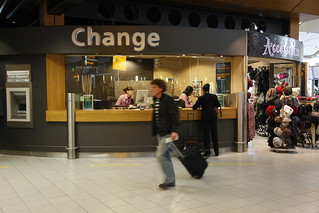13th Sunday in Ordinary Time (A)
Pictures: cc PJ R & Matt Gibson
My dear friends, have you ever been to a money changer? Do you know what it’s like? How about the marriage registry? Ever been there? And if I were to ask you the difference between what goes on at each of these places, what would you say? How would you describe it? What is the difference between changing currencies and registering a marriage?
It’s really quite simple, right? What happens between us and the money changer is basically a transaction. The surrender of one currency in exchange for another. The concern is with the management of assets. Which tends to be an impersonal activity. I don’t even have to do it myself. Someone else could do it for me. As long as I trust that person with my money. Also, what happens at the money changer is typically a one-off deal. I could, of course, keep going back to the same guy. But I don’t have to. Each transaction is complete in itself.
In contrast, the couples at the marriage registry aren’t just performing a transaction. At least we hope not. What they are doing is committing themselves to a new intimate relationship. That of marriage. Which is nothing if not deeply personal. The focus is not so much on the management of their assets as on the investment of their very selves. The donation of their very lives. Which is why what takes place at the registry is significant not just for that one day, important as it may be, but for the whole of the couple’s new life together.
Money changers handle transactions. Marriage registries mediate relationships. Transactions have to do with possessions. Relationships connect persons. The changing of currency can be a one-off affair. But marriages affect one’s whole life. For better or for worse. Till death do us part. It’s helpful and important to keep these differences in mind, as we ponder what our Mass readings are saying to us today. The message is quite clear, isn’t it? Or so it seems. There is an obvious recurring theme. Can you make out what it is?
Yes, it’s hospitality. Welcome. Welcome shown especially to God present in God’s representatives. In the gospel, Jesus tells his apostles, Anyone who welcomes you welcomes me; and those who welcome me welcome the one who sent me. In other words, those who show hospitality to the apostles are being hospitable to Jesus himself. And, in welcoming Jesus, they welcome the heavenly Father who sent him. But that’s not all. We’re also told that this hospitality shown to God actually attracts a reward. Anyone who welcomes a prophet because he is a prophet will have a prophet’s reward…
The first reading gives us a very helpful illustration of what all this looks like. The Shunamite woman welcomes the prophet Elisha precisely because he is a prophet, a man of God. She quite literally makes room for him in her home. As a result, she receives a reward. A great blessing. New life. This time next year, the prophet tells her, you will hold a son in your arms.
The message couldn’t be clearer, right? Show hospitality, and you will receive a reward. Which is an important message for us, especially today. When hospitality often seems to be in such short supply. Even as more and more people experience the dire need for it. The most striking example is, of course, refugees fleeing their war-torn and conflict-ridden countries, in the hope of finding a safe place in which to live.
But it’s not just faraway refugees who need hospitality. It’s also the strangers among us. Not just those who may bear different passports, but also those who think and speak and look different from us. Or even those unnoticed guests who come to our parish for Mass for the first time. And what about the members of our own family? Strange as it may sound, isn’t it true that our own spouses, and parents, and children also often yearn to receive a welcome from us? Dearly wish that we might give them room? Not just room in our homes, but room in our hearts. Room that we offer when we truly listen to what they might have to say. Truly receive and accept them as they are. Could it be that to welcome all these people is also to welcome God? And so to receive a reward?
And yet, much as all this may be true, it still falls short of the deeper message in our readings today. For it is possible to approach hospitality as I would a money changer. As though I were performing a transaction. Seeking to welcome others by focusing only on the transfer of my assets, instead of the investment of my own self. So that hospitality becomes something impersonal. And what’s worse is when I show hospitality to others only in the hope of receiving a reward. Not unlike how I might exchange one currency for another.
Of course, I don’t typically realise that this is what I’m doing at the time. But how do I react when things don’t go well for me despite all my good works? Am I not prone to anger and resentment? To doubt and depression? As though God owes me something for all the good that I have done?
The hospitality that our readings propose is quite different. It’s not a commercial transaction, but a loving relationship. A relationship initiated first of all by God. It is God who has shown hospitality to me. It is God who has made room for me, given me new life, through the dying and rising of Christ the Son. As the second reading reminds us, when we were baptised we went into the tomb with Christ… so that as Christ was raised from the dead… we too might live a new life.
Isn’t this the prophet’s reward? Not a cushy existence in the secular world, but an intimate relationship with God. A new life in God. A secure place in the kingdom of God. A kingdom of love, and justice, and peace, attained not through the exchange of assets, but by the loving self-donation of Christ. So that for us Christians, hospitality is not simply an occasional one-off activity, but a life-long commitment to follow Christ in laying down one’s life in love of others. In love for the Lord. To be hospitable is first to enjoy the hospitality of God in Christ. The same warm welcome that we are gathered here at this Mass to experience and to celebrate. And then to go out and to share it with the many who are in such great need of it.
My dear friends, there is a big difference between the money changer and the marriage registry. Between commercial transactions and true relationship. When we look at our own lives today, which of these do we see?


No comments:
Post a Comment